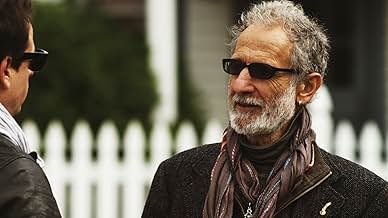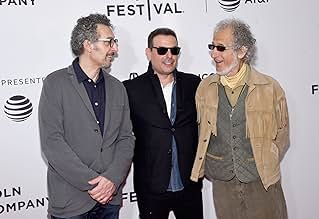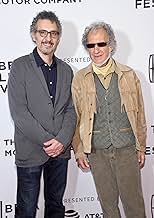Aggiungi una trama nella tua linguaIn his own words, Frank Serpico tells the story of his one-man crusade for police reform in the NYPD during the early 1970s.In his own words, Frank Serpico tells the story of his one-man crusade for police reform in the NYPD during the early 1970s.In his own words, Frank Serpico tells the story of his one-man crusade for police reform in the NYPD during the early 1970s.
Lucy Sante
- Self
- (as Luc Sante)
Trama
Lo sapevi?
- QuizAl Pacino earned a Lead Actor Oscar nomination playing Frank Serpico in the 1973 autobiography film SERPICO directed by Sidney Lumet with the Oscar nominated screenplay written by Waldo Salt and Norman Wexler.
- ConnessioniFeatures Serpico (1973)
Recensione in evidenza
This film kind of assumes the viewer has at least some familiarity with what Frank Serpico is known for: Instead, it's more interested in painting a picture of *who* he is. Lots of scenes show Serpico, a lanky and animated guy in his early 80s, vividly recounting his experiences on prostitution stings, working as a plainclothes cop, and then eventually being transferred to the narcotics division. He speaks of his family and their working-class Italian background, along with the pressure he faced to stay silent in the face of widespread bribery and corruption in the NYPD in the '70s.
The famous incident where he was shot and received little backup (it was suspiciously only called in by a civilian as a 10-10 - "possible crime" - rather than by a fellow officer as a more serious 10-13 - "assist patrolman") is also discussed.
The film flatters and is very much in awe of him; if you hate Serpico for whatever reason then there's really no reason for you to watch this.
Still, the film does attempt to address some of the knee-jerk criticisms ("he's a rat," etc.) mostly by way of Arthur Cesare. He's a retired detective and one-time partner of Serpico's in the narcotics division; he criticizes Serpico to his face for going after the little guys instead of the big bosses who enabled the corrupt behavior which, he also admits, was rampant in the '70s. The film is quick to point out that, as reiterated in the Knapp Commission, Serpico didn't want to wear a wire to record conversations with patrolmen - he too mainly wanted the upper-level rotten apples.
"Get the bosses," Cesare admonishes. "Because without their okay, it will not happen."
"How do you lock up the boss? How do you go after these guys?" Serpico asks.
After a long pause, Cesare says he doesn't know. "I didn't even try," he admits.
I wanted more voices like Cesare's in the film - real cops, retired or not, who disagree with Serpico or even outright hate him. It would've given the film a chance to respond to some of their criticisms, most of which seem to crumble under the harsh light of scrutiny.
The film winds down with some info about the production of the famous "Serpico" movie starring Al Pacino and directed by Sidney Lumet; the real-life Serpico clashed with the director and was uninvited from the set (John Avildsen was going to direct but was apparently let go by the studio before production got underway).
Ultimately the film paints a picture of a regular, working-class guy with some hippie tendencies (Serpico is big into zen) who regarded any semblance of corruption in the force as a personal affront to his sense of morality. The film sees him as almost Christ-like in his ordinariness, though Serpico himself admits he's kind of eccentric.
I saw him as a good guy who, while he did cash in on his fame, is still important in the annals of police history for the anti-corruption work he did.
This documentary could've been more incisive, but it's still pretty good. Worth a watch!
The famous incident where he was shot and received little backup (it was suspiciously only called in by a civilian as a 10-10 - "possible crime" - rather than by a fellow officer as a more serious 10-13 - "assist patrolman") is also discussed.
The film flatters and is very much in awe of him; if you hate Serpico for whatever reason then there's really no reason for you to watch this.
Still, the film does attempt to address some of the knee-jerk criticisms ("he's a rat," etc.) mostly by way of Arthur Cesare. He's a retired detective and one-time partner of Serpico's in the narcotics division; he criticizes Serpico to his face for going after the little guys instead of the big bosses who enabled the corrupt behavior which, he also admits, was rampant in the '70s. The film is quick to point out that, as reiterated in the Knapp Commission, Serpico didn't want to wear a wire to record conversations with patrolmen - he too mainly wanted the upper-level rotten apples.
"Get the bosses," Cesare admonishes. "Because without their okay, it will not happen."
"How do you lock up the boss? How do you go after these guys?" Serpico asks.
After a long pause, Cesare says he doesn't know. "I didn't even try," he admits.
I wanted more voices like Cesare's in the film - real cops, retired or not, who disagree with Serpico or even outright hate him. It would've given the film a chance to respond to some of their criticisms, most of which seem to crumble under the harsh light of scrutiny.
The film winds down with some info about the production of the famous "Serpico" movie starring Al Pacino and directed by Sidney Lumet; the real-life Serpico clashed with the director and was uninvited from the set (John Avildsen was going to direct but was apparently let go by the studio before production got underway).
Ultimately the film paints a picture of a regular, working-class guy with some hippie tendencies (Serpico is big into zen) who regarded any semblance of corruption in the force as a personal affront to his sense of morality. The film sees him as almost Christ-like in his ordinariness, though Serpico himself admits he's kind of eccentric.
I saw him as a good guy who, while he did cash in on his fame, is still important in the annals of police history for the anti-corruption work he did.
This documentary could've been more incisive, but it's still pretty good. Worth a watch!
I più visti
Accedi per valutare e creare un elenco di titoli salvati per ottenere consigli personalizzati
Dettagli
Botteghino
- Lordo Stati Uniti e Canada
- 11.925 USD
- Fine settimana di apertura Stati Uniti e Canada
- 2.283 USD
- 5 nov 2017
- Lordo in tutto il mondo
- 11.925 USD
- Tempo di esecuzione1 ora 38 minuti
- Colore
Contribuisci a questa pagina
Suggerisci una modifica o aggiungi i contenuti mancanti

Divario superiore
By what name was Frank Serpico (2017) officially released in Canada in English?
Rispondi










